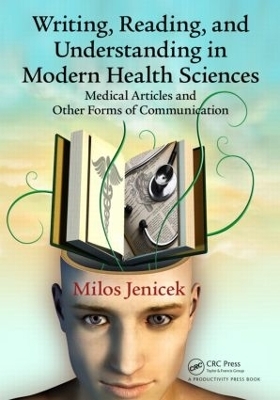
Writing, Reading, and Understanding in Modern Health Sciences
Crc Press Inc (Verlag)
978-1-4822-2645-4 (ISBN)
- Titel z.Zt. nicht lieferbar
- Versandkostenfrei innerhalb Deutschlands
- Auch auf Rechnung
- Verfügbarkeit in der Filiale vor Ort prüfen
- Artikel merken
Writing, Reading, and Understanding in Modern Health Sciences: Medical Articles and Other Forms of Communication will help the authors of medical articles communicate more effectively in today's practice and health research environment. It explores the most effective practices for communicating using three main medical literature formats: through scientific articles, articles where the subject is not based on the practice of the scientific method, and business reports.
Describing how to think beyond the prevailing IMRAD article format, this book focuses on the nature, content, domains of thought, and meanings of medical articles. The ideas and underlying propositions in this book are complementary to specific requirements appropriate for each type of medical journal. After reading this book you will better understand:
How to write what is considered the most important type of medical article, the research-based medical article
How to write an evidence-based argumentative medical article
The challenges of clinical case reporting
The general framework of medical and research ethics
Classification of medical articles and their underlying studies from the causal standpoint
Supplying you with the understanding required to write more effective medical articles, the book includes details about essay-type articles, research-based articles, thesis as introduction sections, definitions as part of the material and methods sections, modern argumentation and critical thinking underlying results and their discussion and conclusions about them. It also examines qualitative research and case study methodologies from other domains.
A must-read for all writers, readers, and users of medical articles, this book supplies the tools you need to write compelling medical reports that can help to improve the practice, research, and quality of healthcare at all levels.
Milos Jenicek, MD, PhD, LMCC, FRCPC, CSPQ, is currently a professor (part-time) in the Department of Clinical Epidemiology and Biostatistics, Faculty of Health Sciences, McMaster University, Hamilton, Ontario, Canada. He also is professor emeritus at the Université de Montréal, Québec, Canada. In 2009, he was elected Fellow of The Royal Society of Medicine, London. Dr. Jenicek has contributed to the evolution of epidemiology as a general method of reasoning and decision making in medicine. Supported by the Université de Montréal, he undertook in the 1970s short sabbaticals and study visits to Harvard, Johns Hopkins, Yale, Tufts, North Carolina at Chapel Hill, and Uniformed Services at Bethesda, Maryland, Universities to further enhance his teaching and research in this direction. Later on, academic, governmental, and professional institutions in Western Europe, North Africa and on the Pacific Rim also have benefitted from his lecturing, professional expertise, visiting professorships and other professional initiatives. During his term as acting chairman of the Department of Social and Preventive Medicine, Université de Montréal (1988–1989), he established a Clinical Epidemiology teaching program at the graduate level at the university; his core course also being part of a similar program at McGill University, where he also was an adjunct professor at that time. Until 1991, he was a member of the Board of Examiners of the Medical Council of Canada (Committee on Preventive Medicine). In 2000, he was invited by Kuwait University to act as an external examiner of their graduating medical students. In addition to numerous scientific papers and other collaborations with leading medical journals, Dr. Jenicek has published 14 textbooks that reflect his national and international initiatives. His current interests include the development of methodologies and applications of logic, critical thinking, decision making and communication in health sciences; enhancement of evidence-based medicine and evidence-based public health; health policies and program evaluations; and decision-oriented (bedside) clinical research.
Essays as Communication Tools. Research-Based Medical Article: Writing What Is Considered the Most Important Type of Written Medical Article. Thesis: A Key Feature of the Medical Article Introduction—Seven Cornerstones for Reporting a Research-Based Study. Definitions: A Key Feature of the Material and Methods Section of a Medical Article. Reporting Research Critically and the Argumentative Way: A Key Feature of the Results and Discussion Sections of a Medical Article. Cause–Effect Relationships: A Key Feature of the Discussion and Conclusion Sections of a Medical Article. Challenges of Clinical Case Reporting: Casus Clinicus Revisitus and Redivivus. Medical Ethics and Publication Ethics. Summary: Future Ways of Knowledge Communication.
| Zusatzinfo | 4 Tables, black and white; 18 Illustrations, black and white |
|---|---|
| Verlagsort | Bosa Roca |
| Sprache | englisch |
| Maße | 178 x 254 mm |
| Gewicht | 408 g |
| Themenwelt | Geisteswissenschaften ► Sprach- / Literaturwissenschaft ► Literaturwissenschaft |
| Medizin / Pharmazie ► Gesundheitswesen | |
| Recht / Steuern ► EU / Internationales Recht | |
| Wirtschaft | |
| ISBN-10 | 1-4822-2645-6 / 1482226456 |
| ISBN-13 | 978-1-4822-2645-4 / 9781482226454 |
| Zustand | Neuware |
| Haben Sie eine Frage zum Produkt? |
aus dem Bereich


